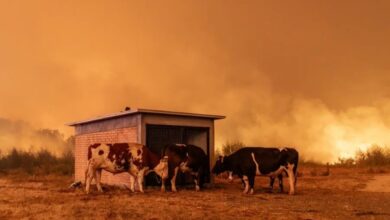Allende and her ‘Long Petal of the Sea’
A story of exile, life in a concentration camp, and love.

Isabel Allende shows us in her book a perspective on the refuge through an episode of the Spanish Civil War. / Photo: amazon.com
The Woman Post | Maria Lourdes Zimmermann
Listen to this article
Leer en español: Allende e sua ‘Long Pétala do Mar’
This 2020 will mark the 80th anniversary of the arrival of the Winnipeg ship on the Chilean coast. A boat loaded with 2000 Spanish refugees that fled the civil war in France and then was taken to Chile, in a bid of the Nobel Prize of Literature Pablo Neruda and former radical President Pedro Aguirre Cerda.
From that event, the Chilean writer Isabel Allende, a refugee for years in Venezuela and now residing in the United States, was inspired to write her latest novel. "Largo Pétalo de Mar", in which she uses a historical episode that followed the Spanish Civil War in 1936-1939 to dramatize her point of view on the refuge, uprooting, and love.
The bestselling author, who was forced to flee Chile, sees refugees as people who deserve understanding. "When you are a refugee you lose, your nation, your tribe, and you have to create a new community. Without the help of other people, it is impossible to achieve this," she said in a recent interview.
Allende was in London to promote her book and was interviewed by Rosianna Halse Rojas, a contributor to UNHCR, the UN Refugee Agency.
In the interview, Allende specified the logic behind choosing her story and argued that the role of a novelist is to create empathy.
"The whole theme of this book is to encourage you to live with an open heart. The moment you tell a story, someone identifies with it, and you can connect," Allende said.
"The loss and separation wounded the hearts of the Spanish refugees, but their eyes remained fixed in the future,"
Allende's vision was sharpened by her personal experience as a refugee, explains journalist Rosianna Halse.
“Often, I had no alternative but to work hard to survive and protect my family. I was a political exile and then an immigrant. That makes one strong.” This is how Chilean writer Isabel Allende answered when asked what gave her the drive to achieve. Her novels have become world-famous modern Latin American classics.
She went into exile after her uncle, Chilean President Salvador Allende, was overthrown in the military coup led by General Augusto Pinochet on September 11, 1973. Isabel had been receiving death threats and learned that her name was on an army blacklist. She fled to Venezuela with her husband and two children, arriving without a visa or a job, but managed to continue her career as a journalist by contributing to the Caracas newspaper, El Nacional.
In 1981, when she received news that her 99-year-old grandfather was dying, Isabel began writing him a letter to make herself feel closer to her family and the home she left behind. The manuscript was to turn into her first and best-known novel, “The House of the Spirits.”
Also read: 1984: George Orwell's masterpiece that is always relevant
"There is no doubt that those experiences of fear and exile stimulated her creativity and helped her become one of the most important and respected writers in Latin America," explains Halse in his article on Allende.
"It also makes the novel deeply relevant."
That explains the love story referred to in "Largo Pétalo de Mar", in which Chile from the 30s to the 90s, is witness to a beautiful and real story of two refugees who lived their exile from Spain, the pain of being in concentration camps in France and the luck of arriving in a country like Chile.
The pianist Roser Bruguera and the doctor Víctor Dalmau are the protagonists. They experienced the uprooting of displacement and the pain of abuse in concentration camps in France.
They married for convenience, as it was the best way to give a pregnant woman and a single man a place in Winnipeg. Their arrival in Chile kept them together, supporting each other in exile and, of course, also loving each other.
"The refugee issue is in the air, and people think that the crisis can be solved by building walls, but that does not work. People who are desperate need to find a place where they feel safe. We need to work together to find global solutions, " concludes Isabel Allende.




